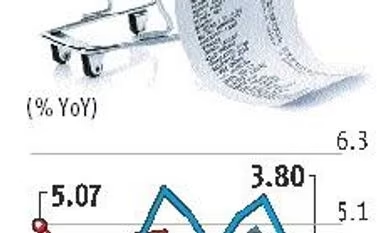Inflation rates, both wholesale and retail, fell in December last year, according to the government data released on Monday. This, in turn, might prompt the Reserve Bank of India (RBI) Monetary Policy Committee (MPC) to change its stance from calibrated tightening to neutral in its review next month.
The retail inflation rate declined to an 18-month low of 2.19 per cent. The wholesale inflation rate also came down to 3.8 per cent, the lowest in eight months.
Falling fuel and food prices caused inflation to fall, according to the data.
The core retail inflation rate touched a nine-month low of 5.6 per cent.
“In the next MPC meet, the stance could be altered to neutral,” said Madan Sabnavis, chief economist at CARE Ratings.
Other economists concurred, with some saying the RBI could even lower policy rates to boost slower-than-expected economic growth.
According to the official Advance Estimates, gross domestic product (GDP) growth for 2018-19 or FY19 was pegged at 7.2 per cent. This is lower than the RBI’s projection of 7.4 per cent and the finance ministry’s estimate of 7.5 per cent growth.
“This paves the way for the MPC to not only change its stance to neutral but also mull over a possible rate cut. The inflation trajectory looks below 4 per cent over the next quarter,” said Shubhada Rao, chief economist, YES Bank. ICICI Global Markets Group Head B Prsasanna said the MPC could be an extended pause on policy rates.
In the monetary policy statement, the RBI had forecast the retail inflation rate to be between 2.7 per cent and 3.2 per cent in the second half of FY19.
The consumer food price index contracted 2.51 per cent in December; in November, it had contracted 2.61 per cent. Food prices were dragged down by a decline in prices of pulses and vegetables, sugar and eggs. The pulses and products index has been contracting since December 2016, while vegetables have been contracting since July 2018.
The former contracted 7.13 per cent in December; the latter 16.14 per cent. At the aggregate level, the consumer food and beverages index has now contracted for three straight months.
Softer global crude oil prices also dragged down the fuel and light inflation rate to 4.5 per cent in December from 7.39 per cent in November.
“At 2.19 per cent, the consumer price index (CPI) for December has printed close to our estimate of 2.11 per cent. Led by continuing contraction in food prices, the softer CPI inflation was supported by contraction in fuel prices and housing in December,” said Rao.
For housing, this was a seasonal contraction.
Economists said the inflation rate could fall more.
"We are expecting further moderation in inflation in the coming months. This would be aided by a high base effect and subdued food prices," said Sabnavis.
At the wholesale level, fuel and power continued to decline, falling to 8.38 per cent in December, from 16.28 per cent in November. Inflation in manufactured products slowed to a seven-month low of 3.59 per cent in December, from 4.21 per cent in November. Eleven out of 17 industries witnessed moderation.
"Moderation in wholesale prices has been aided by subdued food prices in vegetables, fruits, and onions, along with fuel and power," said Sabnavis.
Unlock 30+ premium stories daily hand-picked by our editors, across devices on browser and app.
Pick your 5 favourite companies, get a daily email with all news updates on them.
Full access to our intuitive epaper - clip, save, share articles from any device; newspaper archives from 2006.
Preferential invites to Business Standard events.
Curated newsletters on markets, personal finance, policy & politics, start-ups, technology, and more.
)